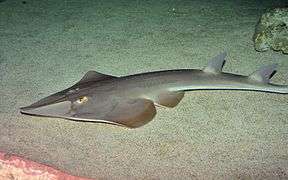Common guitarfish
The common guitarfish (Rhinobatos rhinobatos) is a species of cartilaginous fish in the family Rhinobatidae. It is native to the eastern Atlantic Ocean and the Mediterranean Sea. It is a bottom-dwelling fish feeding on crustaceans, other invertebrates and fish. The females give birth to live young. Its lifestyle makes it vulnerable to trawling and other fishing methods, populations seem to be declining and it has disappeared from parts of its range. The International Union for Conservation of Nature has assessed its conservation status as being "endangered".
| Common guitarfish | |
|---|---|
 | |
| Scientific classification | |
| Kingdom: | |
| Phylum: | |
| Class: | |
| Order: | |
| Family: | |
| Genus: | |
| Species: | R. rhinobatos |
| Binomial name | |
| Rhinobatos rhinobatos | |
| Synonyms | |
Description
The common guitarfish can grow to a length of about 147 cm (58 in), but a more normal length is about 80 cm (30 in). The dorsal surface is khaki-brown and the underparts are white.[3] It is very similar in appearance to the blackchin guitarfish (Rhinobatos cemiculus), which shares its distribution, but is generally smaller, has larger eyes, more widely separated rostral ridges, a longer front nasal lobe and a wider back nasal flap.[4]
Distribution
The common guitarfish is found in the western North Atlantic Ocean. Its range extends from the southern end of the Bay of Biscay to Angola, including the Mediterranean Sea.[1] It cruises slowly around just above the seabed, sometimes resting on the sand or mud and semi-covering itself with sediment.[3]
Ecology
The common guitarfish is a benthic fish, cruising along just above the sandy or muddy seabed and foraging for crustaceans, other invertebrates and fish. It is an ovoviviparous fish with one or two litters of live young being born each year, each litter being four to ten fish. The gestation period is about four months,[1] and the young develop inside the female, obtaining nourishment from their yolk sacs at first, and later from uterine secretions of their mother.[3]
Status
The common guitarfish lives close to the coast and breeds in shallow water. This makes it vulnerable, and it is fished, primarily as bycatch, over much of its range. In the northern Mediterranean, catches used to be landed, along with the blackchin guitarfish (Rhinobatos cemiculus), at fishing ports such as Palermo, but both fish are now no longer seen there and have probably been extirpated from the area. It is no longer to be seen in the Balearic Islands either. Off the coasts of West Africa, it is caught as bycatch by international shrimp trawling vessels, and by cephalopod fisheries trawling the seabed, as well as being caught by local artisanal gill net fishermen. Its meat may be salted and exported and its fins sold to Asia. It may be safest in the southern Mediterranean where the fishing is less intensive and it is still sometimes landed, but even there, most of the fish landed are immature. For the fish to have a long-term future and the fisheries to be sustainable, the adult fish need to be allowed to mature and breed. There is no special conservation plan for this fish and the International Union for Conservation of Nature has assessed its conservation status as being "endangered".[1]
References
- Notarbartolo di Sciara, G.; Bradai, M.N.; Morey, G.; Marshall, A.D.; Compagno, L.J.V.; Mouni, A.; Hicham, M.; Bucal, D.; Dulvy, N.; Heenan, A.; et al. (2007). "Rhinobatos rhinobatos". IUCN Red List of Threatened Species. 2007: e.T63131A12620901. doi:10.2305/IUCN.UK.2007.RLTS.T63131A12620901.en.
- Bailly, Nicolas (2015). "Rhinobatos rhinobatos (Linnaeus, 1758)". WoRMS. World Register of Marine Species. Retrieved 16 January 2016.
- "Rhinobatos rhinobatos (Linnaeus, 1758): Common guitarfish". FishBase. Retrieved 16 January 2016.
- "Common guitarfish (Rhinobates rhinobatos)". Fishes of the NE Atlantic and the Mediterranean. Marine Species Identification Portal. Retrieved 17 January 2016.
